初中英语介词
初中英语介词用法总结与归纳
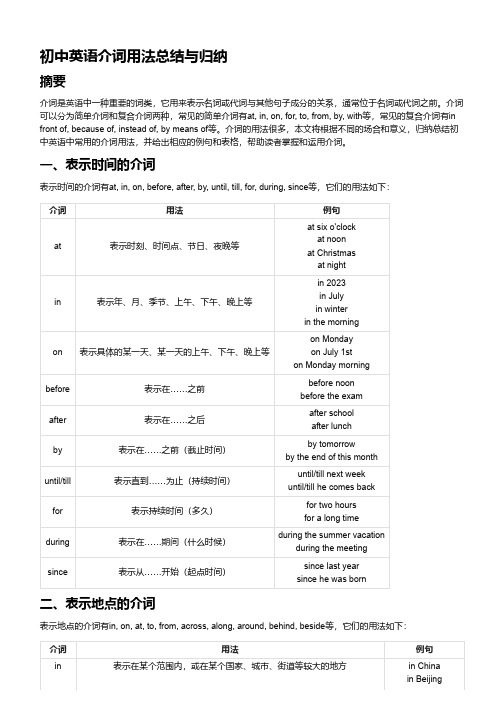
初中英语介词用法总结与归纳摘要介词是英语中一种重要的词类,它用来表示名词或代词与其他句子成分的关系,通常位于名词或代词之前。
介词可以分为简单介词和复合介词两种,常见的简单介词有at, in, on, for, to, from, by, with等,常见的复合介词有in front of, because of, instead of, by means of等。
介词的用法很多,本文将根据不同的场合和意义,归纳总结初中英语中常用的介词用法,并给出相应的例句和表格,帮助读者掌握和运用介词。
一、表示时间的介词表示时间的介词有at, in, on, before, after, by, until, till, for, during, since等,它们的用法如下:介词用法例句at表示时刻、时间点、节日、夜晚等at six o'clock at noonat Christmas at nightin表示年、月、季节、上午、下午、晚上等in 2023in Julyin winterin the morningon表示具体的某一天、某一天的上午、下午、晚上等on Mondayon July 1ston Monday morningbefore表示在……之前before noon before the examafter表示在……之后after school after lunchby表示在……之前(截止时间)by tomorrowby the end of this monthuntil/till表示直到……为止(持续时间)until/till next week until/till he comes backfor表示持续时间(多久)for two hours for a long timeduring表示在……期间(什么时候)during the summer vacation during the meetingsince表示从……开始(起点时间)since last year since he was born二、表示地点的介词表示地点的介词有in, on, at, to, from, across, along, around, behind, beside等,它们的用法如下:介词用法例句in表示在某个范围内,或在某个国家、城市、街道等较大的地方in Chinain Beijing介词用法例句in ZhongshanRoadon表示在某个表面上,或在某个楼层、台阶等较小的地方,或在某个方位上on the wall on the secondflooron the left/rightat 表示在某个具体的位置或地点,或在某个机构、场所等较小的地方,或表示靠近、附近等at the cornerat schoolat the bus stopto表示朝向某个方向或地点,或表示到达某个地点(范围之外)to the east to Japan to schoolfrom表示从某个地点出发或离开(范围之外)from home from Shanghai from Chinaacross表示横穿或穿过(从一边到另一边)across the street across the riveralong表示沿着或顺着(在一边)along the road along the riveraround表示围绕或环绕(在四周)around the lake around the worldbehind表示在……后面behind the door behind himbeside表示在……旁边beside the window beside her三、表示方向的介词表示方向的介词有to, from, into, out of, onto, off, up, down, through等,它们的用法如下:介词用法例句to表示朝向某个方向或地点,或表示目的地He is going to Beijing. She gave the book to me.from表示从某个方向或地点出发或离开,或表示来源He came from the south. This is a gift from my friend.into表示进入某个范围或空间(由外到内)He jumped into the water. She put the flowers into the vase.out of表示离开某个范围或空间(由内到外)He ran out of the room. She took the book out of the bag.onto表示移动到某个表面上(由低到高)He climbed onto the roof. She threw the ball onto the ground.off表示从某个表面上移开(由高到低)He fell off the bike. She took off her hat.up表示向上移动(由低到高)He went up the hill.介词用法例句She climbed up the ladder.down表示向下移动(由高到低)He came down the stairs. She slid down the slide.through表示穿过某个空间或物体(从一端到另一端)He walked through the forest. She looked through the window.四、表示方式、手段、工具的介词表示方式、手段、工具的介词有by, with, in, on等,它们的用法如下:介词用法例句by 表示交通工具、方式、方法等,或表示被动语态的动作执行者,或表示时间的截止点,或表示计量单位等by busby mistakeby himby tomorrowby weightwith 表示使用某种工具、器具、材料等,或表示伴随的人或物,或表示具有某种特征、状态等,或表示原因、理由等with a knifewith hisparentswith long hairwith joyin 表示使用某种语言、文字、颜色等,或表示穿着某种衣服,或表示处于某种状态、情况等,或表示在某种范围内等in Englishin black andwhitein a red dressin a hurryin generalon 表示使用某种电子设备、媒体等,或表示依靠某种力量、条件等,或表示以某种方式等,或表示参与某种活动等on TVon footon fireon dutyon holiday五、表示原因、目的、结果的介词表示原因、目的、结果的介词有for, at, from, of, with, by, because of, owing to, thanks to, out of, through等,它们的用法如下:介词用法例句for 表示原因、理由,常与sorry, famous, punish, praise, thank, blame等连用,也表示目的、意图,常与hope, wish, wait, look, come, go等连用,也可以表示用途、功能等for peacefor helpfor a walkfor funfor cutting paperat表示目的、意图,常与surprised, shocked, amazed, good, bad等连用,也可以表示针对、针对性等at his words at the news at math介词用法例句at solvingproblemsfrom 表示结果、效果,常与different, far, free, safe等连用,也可以表示来源、出发点等from the picturefrom now onfrom dangerfrom birthof 表示原因、理由,常与afraid, proud, sure, tired等连用,也可以表示所属、属性、特征等of the darkof himof the resultof his workwith 表示原因、理由,常与pleased, satisfied, angry, happy等连用,也可以表示伴随、方式、工具等with the answerwith himwith a smilewith a knifeby 表示方式、方法、手段等,也可以表示被动语态的动作执行者,或表示时间的截止点,或表示计量单位等by doing thisby himby tomorrowby weightbecauseof 表示原因、理由,相当于一个从句,后面接名词或代词等because of therainbecause of thatowing to表示原因、理由,相当于一个从句,后面接名词或代词等owing to the trafficjamowing to hisillnessthanks to表示原因、理由,含有感激或讽刺的意味,后面接名词或代词等thanks to yourhelp thanks to his carelessnessout of表示原因、理由,含有出于某种动机或感情的意味,后面接名词或代词等out of curiosity out of pitythrough表示原因、理由,含有经过某种过程或方式的意味,后面接名词或代词等through hard work through a window六、表示对象、范围的介词表示对象、范围的介词有of, for, about, with, to, from, among, between等,它们的用法如下:介词用法例句of表示所属、属性、特征等,也可以表示分离、脱离等the color of the skya cup of teaa friend of mineget rid of itfor表示目标、对象、受益者等,也可以表示目的、原因等 a gift for youa seat for twoa doctor for the poora room for rentabout表示主题、内容、话题等,也可以表示大约、左右等a book about history tell me about yourself about ten minuteswith表示伴随、陪同等,也可以表示方式、工具等stay with mea man with glasses speak with a loud voice cut it with a knifeto表示方向、目的地等,也可以表示对象、接受者等go to school fly to London say hello to him give it to herfrom表示来源、出发点等,也可以表示对象、对比者等come from Chinaa letter from my father different from youlearn from himamong表示在三个或三个以上的人或物之间(内部)share it among yourselves a flower among the grassbetween表示在两个人或物之间(内部或外部)sit between thema river between two mountains七、其他常用的介词除了上述介词外,还有一些其他常用的介词,如as, like, except, without, beyond, above, below, over, under等,它们的用法如下:介词用法例句as表示身份、职业、角色等,也可以表示方式、方法、程度等as a teacher as usual as you know as well aslike表示相似、类似等,也可以表示喜欢、喜爱等like a birdlike father, like sonI like music.except表示除……之外(不包括)everyone except me every day except Sundaywithout表示没有、缺少等without money without water without a wordbeyond表示超出、超过等beyond the wall beyond my expectation beyond controlabove表示在……之上(不接触)above the ground above sea levelabove allbelow表示在……之下(不接触)below the surface below zero below averageover表示在……之上(覆盖或接触)over the bridge over his head over the phoneunder表示在……之下(覆盖或接触)under the tree under his arm under the weather。
【初中英语】介词大全,你需要的都在这里
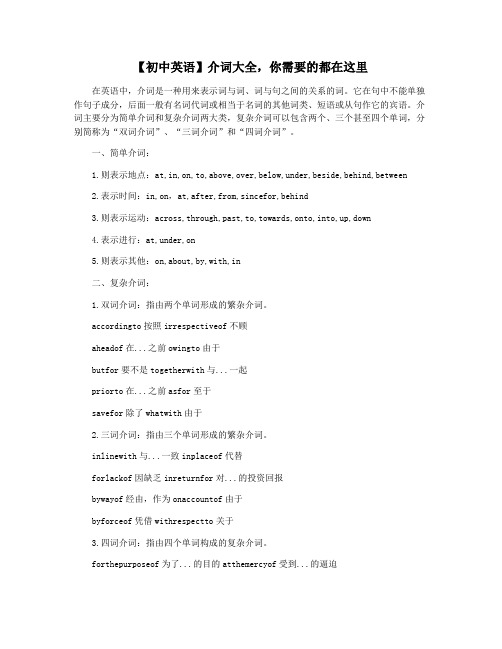
【初中英语】介词大全,你需要的都在这里在英语中,介词是一种用来表示词与词、词与句之间的关系的词。
它在句中不能单独作句子成分,后面一般有名词代词或相当于名词的其他词类、短语或从句作它的宾语。
介词主要分为简单介词和复杂介词两大类,复杂介词可以包含两个、三个甚至四个单词,分别简称为“双词介词”、“三词介词”和“四词介词”。
一、简单介词:1.则表示地点:at,in,on,to,above,over,below,under,beside,behind,between2.表示时间:in,on,at,after,from,sincefor,behind3.则表示运动:across,through,past,to,towards,onto,into,up,down4.表示进行:at,under,on5.则表示其他:on,about,by,with,in二、复杂介词:1.双词介词:指由两个单词形成的繁杂介词。
accordingto按照irrespectiveof不顾aheadof在...之前owingto由于butfor要不是togetherwith与...一起priorto在...之前asfor至于savefor除了whatwith由于2.三词介词:指由三个单词形成的繁杂介词。
inlinewith与...一致inplaceof代替forlackof因缺乏inreturnfor对...的投资回报bywayof经由,作为onaccountof由于byforceof凭借withrespectto关于3.四词介词:指由四个单词构成的复杂介词。
forthepurposeof为了...的目的atthemercyof受到...的逼迫forthesakeof为了inthecareof由...照管intheteethof罔顾,逆着ontheeveof在...的前夕onthegroundof根据onthepartof在...方面totheexclusionof把...确定出外withaneyeto为了undertheauspicesof在...的支持下undertheguiseof在...的幌子下。
初中英语语法介词
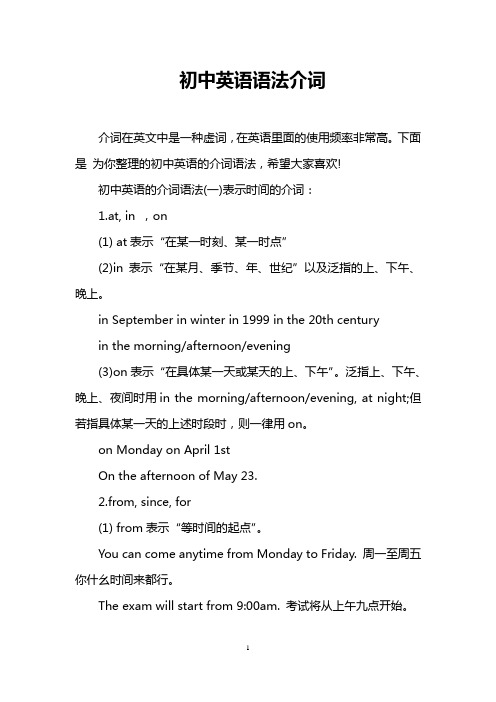
初中英语语法介词介词在英文中是一种虚词,在英语里面的使用频率非常高。
下面是为你整理的初中英语的介词语法,希望大家喜欢!初中英语的介词语法(一)表示时间的介词:1.at, in ,on(1) at表示“在某一时刻、某一时点”(2)in表示“在某月、季节、年、世纪”以及泛指的上、下午、晚上。
in September in winter in 1999 in the 20th centuryin the morning/afternoon/evening(3)on表示“在具体某一天或某天的上、下午”。
泛指上、下午、晚上、夜间时用in the morning/afternoon/evening, at night;但若指具体某一天的上述时段时,则一律用on。
on Monday on April 1stOn the afternoon of May 23.2.from, since, for(1) from表示“等时间的起点”。
You can come anytime from Monday to Friday. 周一至周五你什幺时间来都行。
The exam will start from 9:00am. 考试将从上午九点开始。
(2) since表示“自从……以来(直到现在)”He has been away from home since 1973. 他自从1973年就离开了家乡。
We have known each other since ten years ago.我们十年前就认识了。
(3) for 与since表示一段时间,但for与时间段连用,而since 与时间点连用。
for two hours since last week3.after, in, within(1) after表示“在……之后”,是before的反义词。
初中英语介词用法归纳总结
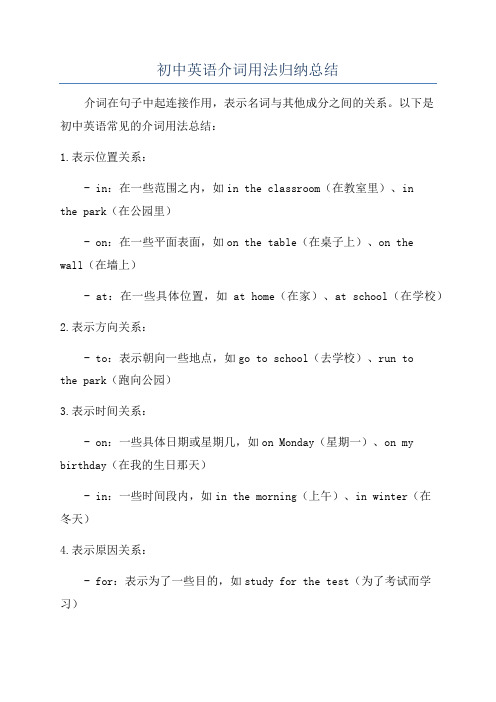
初中英语介词用法归纳总结介词在句子中起连接作用,表示名词与其他成分之间的关系。
以下是初中英语常见的介词用法总结:1.表示位置关系:- in:在一些范围之内,如in the classroom(在教室里)、inthe park(在公园里)- on:在一些平面表面,如on the table(在桌子上)、on thewall(在墙上)- at:在一些具体位置,如at home(在家)、at school(在学校)2.表示方向关系:- to:表示朝向一些地点,如go to school(去学校)、run tothe park(跑向公园)3.表示时间关系:- on:一些具体日期或星期几,如on Monday(星期一)、on my birthday(在我的生日那天)- in:一些时间段内,如in the morning(上午)、in winter(在冬天)4.表示原因关系:- for:表示为了一些目的,如study for the test(为了考试而学习)- because of:表示因为一些原因,如because of the rain(因为下雨)5.表示方式或手段:- by:通过其中一种方式或手段,如by bus(乘公交车)、by email(通过邮件)6.表示比较、对照关系:- than:与人或物进行比较,如I am taller than my brother(我比我兄弟高)7.表示从属关系:- of:表示所属关系,如the book of the teacher(老师的书)- to:表示归属关系,如a friend to me(对我来说的一个朋友)这些是初中英语中常见的介词用法,但还有其他一些特殊用法,需要根据具体语境来确定使用。
解析初中英语介词at,in,on,be,with的用法

解析初中英语介词at,in,on,be, with……的用法
介词在英语学习中就是一个连接的作用, 看似不起眼的知识点, 却是每次考试的必考内容!细心的同学都会发现, 如果遇到语法知识讲解的时候, 老师在讲到介词的时候都会着重进行一个讲解, 因为它真的很重要!
最常见的介词有)at , in, on, to, for, be, do, for, with……很多很多。
这些介词是同学们每天都在接触的, 基本上每一句话里面都有介词的出现。
所以想要学好英语掌握介词的用法是重中之重!
今天瑞德特教育英语柯老师整理了初中阶段最重要的介词用法, 希望各位家长能够为孩子收藏出来!因为不仅仅是预习, 复习和记忆的时候这份资料对孩子而言都有非常重要的意义!
由于篇幅有限, 今天我就先分享到这里。
希望同学们在学习过程中结合正确的学习方法, 激发学习兴趣, 勤思考, 多动脑, 孩子的学习效率才会大大提升。
初中英语介词的知识点总结
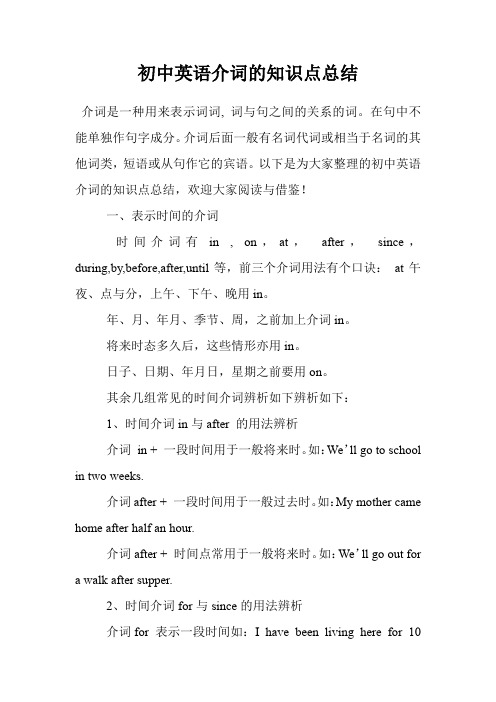
初中英语介词的知识点总结介词是一种用来表示词词, 词与句之间的关系的词。
在句中不能单独作句字成分。
介词后面一般有名词代词或相当于名词的其他词类,短语或从句作它的宾语。
以下是为大家整理的初中英语介词的知识点总结,欢迎大家阅读与借鉴!一、表示时间的介词时间介词有in , on,at,after,since,during,by,before,after,until等,前三个介词用法有个口诀:at午夜、点与分,上午、下午、晚用in。
年、月、年月、季节、周,之前加上介词in。
将来时态多久后,这些情形亦用in。
日子、日期、年月日,星期之前要用on。
其余几组常见的时间介词辨析如下辨析如下:1、时间介词in与after 的用法辨析介词in + 一段时间用于一般将来时。
如:We’ll go to school in two weeks.介词after + 一段时间用于一般过去时。
如:My mother came home after half an hour.介词after + 时间点常用于一般将来时。
如:We’ll go out fora walk after supper.2、时间介词for与since的用法辨析介词for 表示一段时间如:I have been living here for 10years.介词since 表示从过去某一时间以来如:I have been living here since 2000.3、时间介词before与by的用法辨析介词before表示“在…之前”如:He won’t come back before five .介词by表示“到…时为止,不迟于…”如:The work must be finished by Friday.4、时间介词during与for的用法辨析当所指的时间起止分明时用介词during如:He swims every day during the summer.如果一段时间不明确则用介词for如:I haven’t seen her for years.5、时间介词till与until用法的异同till和until用在肯定句中,均可表示“直到…为止”,如:I will wait till(until)seven o'clock.till和until用在否定句中,均可表示“在…以前”或“直到…才”。
初中英语语法专题—介词讲解
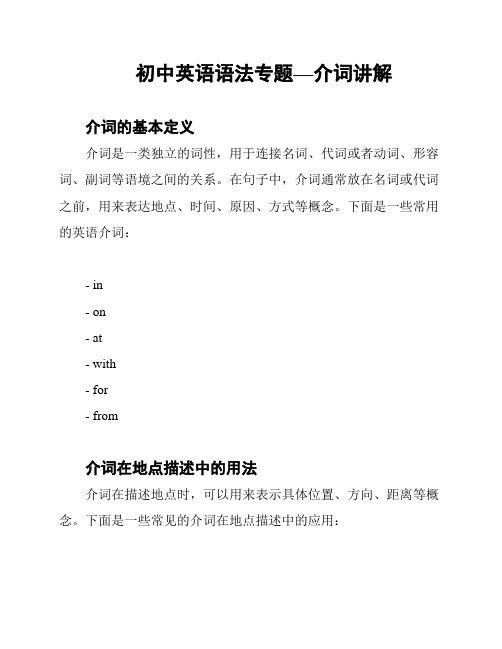
初中英语语法专题—介词讲解介词的基本定义介词是一类独立的词性,用于连接名词、代词或者动词、形容词、副词等语境之间的关系。
在句子中,介词通常放在名词或代词之前,用来表达地点、时间、原因、方式等概念。
下面是一些常用的英语介词:- in- on- at- with- for- from介词在地点描述中的用法介词在描述地点时,可以用来表示具体位置、方向、距离等概念。
下面是一些常见的介词在地点描述中的应用:- in:用于表示在某个范围之内的位置,例如 "in the room"(在房间里),"in the park"(在公园里)。
- on:用于表示在表面、平台或者位置上的状态,例如 "on the table"(在桌子上),"on the bus"(在公交车上)。
- at:用于表示在某个具体位置或者地点,例如 "at the cinema"(在电影院),"at school"(在学校)。
- to:用于表示朝向某个位置的移动,例如 "go to the park"(去公园)。
介词在时间描述中的用法介词在描述时间时,可以用来表示具体时间、时间段等概念。
下面是一些常见的介词在时间描述中的应用:- at:用于表示具体的时间点,例如 "at 7 o'clock"(在7点钟)。
- on:用于表示具体的日期或者星期几,例如 "on Monday"(星期一),"on January 1st"(1月1日)。
- in:用于表示较长的时间段或者某一个时间段内,例如 "inthe morning"(早上),"in July"(在七月)。
介词在原因描述中的用法介词在描述原因时,可以用来表示某事的起因或者原因。
介词(19张PPT)初中英语专项复习课件

(五)at 与in at与较小的地点连用,in与较大的地点连用。如: He arrived at school at 8 o'clock. 他八点到达学校。 He arrived in Paris yesterday. 他昨天到达巴黎。
(三)be+形容词+介词 be born in…出生于…… be good at…擅长…… be made of…由……制成 be angry with sb.跟某人生气 be angry at sth.为某事生气 be pleased with sb.对某人感到满意 be satisfied with sth.对某事感到满意 be surprised at… 对……感到惊奇(诧异)
They walked through the forest. 他们穿过森林。
(四)in front of与in the front of in front of 表示“在某人或某物的前面”,在某个范围以外; in the front of 表示“在……的前部”,在某个范围以内。如: There are some tall trees in front of the building. 这座楼前面有一些高高的树木。
(二)介词+名词 in time 及时 on time 准时 at home 在家 in English 用英语 at night 在晚上 with a smile 带着微笑 without breakfast 没吃早餐 at first 首先 at last 最后
on one's way to… 在某人去……的路上 at once 立刻,马上 at the same time 同时 by hand 手工,亲手 in trouble 处于困境 in fact 事实上 on duty 值日 on the left/right 在左/右边 to one's surprise 令某人吃惊的是
- 1、下载文档前请自行甄别文档内容的完整性,平台不提供额外的编辑、内容补充、找答案等附加服务。
- 2、"仅部分预览"的文档,不可在线预览部分如存在完整性等问题,可反馈申请退款(可完整预览的文档不适用该条件!)。
- 3、如文档侵犯您的权益,请联系客服反馈,我们会尽快为您处理(人工客服工作时间:9:00-18:30)。
介词1.in; on; at用在时间词前,表“在”1)at + 具体时刻2)on + 具体某天(具体某天的上、下午等;星期词;以及上、下午词前有修饰词时)3)in + 年、月、季节及一天中的某部分但注意:at night= in the night at noonat this / that time at Christmaseg. 1.___ the morning 2.___ Monday morning3. ___ a rainy evening4. ___3:505.__ 20026.___ the morning of April 107.___ spring8.___ night 9.___ this time 10. ___ March另外注意:在时间词(morning , afternoon , evening ; Sunday…)前有last, next , this , that时,不再用介词. tomorrow, tonight前也不用介词。
eg. I will go(A) to the cinema(B) in(C) this evening. ______________2. in , on , at 表地点:at一般指小地方;in一般指大地方或某个范围之内;on往往表示“在某个物体的表面”。
例如:eg. 1)He arrived ___Shanghai yesterday.2)They arrived ___a small village before dark.3)There is a big hole ____ the wall.4)The teacher put up a picture ____ the wall.3.in , on , to表方位in(范围内);on(范围外且接壤);to(范围外但不接壤)。
可表示为下图的位置关系eg.1)Taiwan is in the southeast of China.2)Hubei is on the north of Hunan.3)Japan is to the east of China.cross: 动词“跨过,越过”=go across4. across: (表面)跨过through: (内部)穿过,贯穿介词eg. 1)Can you swim _____ the river?2)The road runs __________ the forest.3) _____ the bridge, you’ll find a cinema.5. in + 时间段:与将来时连用after + 时间段:与过去时连用但after + 时间点:可与将来时连用。
1) I’ll leave _______ three o’clock.. That is, I’ll leave ________ about ten minutes.2)They left _______ two weeks.6. in the tree(外加在树上的事物)on the tree(树上自身具有的花、果、叶等)in the wall(镶嵌在墙内部的事物)7. on the wall(墙表面的事物)1) There is a map ___ the wall8.by bike / bus / car / ship (单数且无冠词)但当这些交通工具名词前有其它修饰词时,则应使用相应的介词。
eg. by bike = on a(the; his) bikeby car = in a(the ; her) caron: 在…(表面)上——接触9. over: 在…的正上方above: 在…的斜上方未接触1) The moon rose ______ the hill.2) There is a bridge _____ the river.3) There is a book ______ the desk.10. between: 在(两者)之间among :在(三者以上)之间1)A big crowd of people were waiting for Li Lida on the beach. ________ them were his parents.2)Tom sits ________Lucy and Lily.11.on与about : 关于on用于较正式的演讲、学术、书籍等about用于非正式的谈话或随便提及eg. He gave a talk ____ the history of the Party12. in front of :在…前面/方(范围外)= beforein / at the front of:在……前部(范围内)1)There is a big tree _______ of the classroom.2)A driver drives _________ of the bus.类似区别:at the back of与behind13.with和in: 表示“用“with: 指“用工具、手、口等”in: 指“用语言、话语、声音等”1) Please write the letter ____ a pen.2) Please speak ____ a loud voice.14. on a farm ; in a factory ; the girl in the hat ; leave for: 动身前往某地15.一些固定搭配:(1)介词与动词的搭配listen to , laugh at, get to, look for;wait for, hear from, turn on, turn off, worry about, think of, look after, spend…on…, 等。
(2)介词与名词的搭配on time, in time, by bus, on foot,with pleasure, on one’s way to, in trouble,at breakfast, at the end of, in the end等。
(3)介词与形容词的搭配be late for, be afraid of, be good at,be interested in, be angry with,be full of, be sorry for等。
一、语法选择1、____ weekends, we get up at 9:00.A. AtB. OnC. In2、We see a comedy ______ Thursday morning.3、What do you do ____ weekends?A. inB. onC. for4、We eat dinner _____ the evenning.A. inB. atC. on5、We have science from 10:00 ____ 11:00.A. atB. toC. and6、I play sports ____ two hours every day.A. forB. atC.after7、--_____ do you get up every day?--_____ six o'clock.A. What time, onB. When, inC. What time, at8、We'll deliver your pizza _______.A. for half a hourB. in half an hourC. at half an hour9、We don't go to school ____ Sundays.A. onB. atC. in10、--How long are you staying in Hong Kong? --____ just the weekend.A. InB. DuringC. for11、I hope you _____ to my party ____ next Sunday.A. to come, /B. will come, onC. will come, /12、What did you do _____ your last trip?A. onB. ofC. in13、Halloween is ______ October 31 every year.A. onB. inC. at14、All the students will have a party ____ the afternoon of January 1.A. inB. onC. at15、Are you going camping ___ Tuesday?A. onB. inC. at16、What do you like to do ____ vacation?A. onB. inC. at17、____ weekends, when do you get up?A. InB. OnC. For18、I was born ____ the morning of March 18 th, 199l.A. InB. OnC. Of19、I'm going to the doctor ________ Tuesday afternoon.A. onB. inC. at20、-How soon will he come back? -______ two days.A. BeforeB. afterC. inD. for21、My father will be back from Beijing___ a week.A. inB. forC. afterD. later22、Everyone went to the Great Wall ___ me.A. besideB. besidesC. exceptD.no23、There are some similarties ________ Pedro and Paul.A. amongB. betweenC. in24、Mr Brown's daughter likes to read the same books ______ he does.A. likeB. withC. as25、I can't visit next week. I have to study _______ my science test.A. atB. forC. to26、Other parts of the world are different ____ the United States.27、How do the students ____ the world get to school?A. onB. aroundC. about28、In North America, most students go to school ____ the school bus.A. onB. byC. in29、Is the bus station far _____ your home?A. fromB. toC. of30、--How do you usually come to school? -- ____ car.A. ByB. By aC. In31、What's the matter ____ her?A. atB. ofC. with32、Is Katrina's life the same ____ yours?A. asB. toC. with33、Don't read in bed. It's bad ___ your eyes.A. forB.ofC. with34、My friend Emma lokes helping others _____ English.A. learningB. onC. with35、Japan is _____ the east of Asia and ____ the north of Australia.A. in, toB. to, toC. in, on36、Taiwan is ____ the south of China.A. toB. inC. on37、Animals can't live ______ air.A. withB. noC. without38、Jack want to be a scientist _____ the future.A. inB. onC. for39、____ the end of the day, they were all tired.A.onB. inC. at40、London is famous _____ the fog.A. onB. inC. for41、There are many actors ______ the aquarium.A. onB. inC. at42、Tha children all over the world are the same _____ many ways.A. inB. onC. from43、The lake is different ___ the river.A. inB. fromC. with44、Let's go there _____ our bikes.A. inB. byC. on45、Patrick can not only speak _____ Chinese, but also sing _____ Chinese.A. in, inB. in, /C. /, in46、"Please wait _____ the bus stop until I come back." The mother told the children.A. forB. inC. at47、There are a few differences ____ English names and Chinese names.A. fromB. betweenC. in48、Here is the weather report ____ the next twenty-four hours.A. ofB. forC. in49、What's the matter ____ him?A. forB. toC. with50、My parents often take me to the park ____ holidays.A. atB. onC. toA. two large pizzaB. three small hamburgerC. four medium pizzas52、What would you like _____ your pizza?A. onB. toC. for53、I'd like a pizza _____ mushrooms and pepperoni.A. hasB. withC. in54、My friend Lucy sits next _____ me.A. inB. onC. to55、The pay phone is ____ the hotel.A. cross fromB. across fromC. far56、She is sitting _____ me.A. in the front ofB. in front ofC. in the middle of57、It's 2 kilometers ______ here.A. awayB. away fromC. near58、Our supermarket is next to the post office _____ the right.A. onB. inC. to59、The post office is _____ the school ____ the hotel.A. between, orB. between, andC. behind, before60、The post office is across ____ the hotel.A. fromB. toC. in61、There is a house _____ a garden between the park and the hotel.A. haveB. withC. next to62、Is there a pay phone ____ this neighborhood?A. onB. inC. between63、The school is ____ the park.A. nextB. fromC. next to64、I like rice and Cola _____ lunch.A. inB. ofC. for65、The window is ____ the wall and the pichure is ____ the wall.A. on, onB. in, inC. in, on66、Please look at the photo ____ the family.A. ofB. forC. on67、_____ breakfast, he likes eggs, milk and apples.A. ForB. AtC. In68、Do you want to join the art club? Please call Mary _____ 75-3234.A. forB. with C at69、Are you good ____ children?A. atB. withC. in70、look, there is a pencil case _____ the floor.A. inB. onC. at71、The teacher is talking ____ the new student.A. withB. onC. for72、Please write ____ me soon.A. withB. inC. to。
